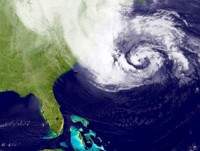Hurricane Sandy not enough to convince people that climate change is real
 In the immediate aftermath of the storm, the devastating impacts of Hurricane Sandy seemed sure to become a wake-up call to many North Americans about the realities of climate change.
In the immediate aftermath of the storm, the devastating impacts of Hurricane Sandy seemed sure to become a wake-up call to many North Americans about the realities of climate change.As Business Week noted on its cover of the issue following the storm’s impact: “It’s Global Warming, Stupid”.
However, research conducted by the Yale Project on Climate Change Communication shows that perceptions of the storm aren’t that straightforward.
In a 2012 study examining key issues of public perception and climate change, the researchers found that people’s political opinions and pre-existing beliefs tend to shape their perceptions of a particular event.
This is due to a phenomenon researchers call ‘motivated reasoning’, which means that humans will rationalize any experience to understand it in a way that stays consistent with previously held beliefs.
In other words, if you don’t believe climate change is real, when you see Hurricane Sandy, you will rationalize it as being just a really big storm. ‘Motivated reasoning’ seems to be exactly what the majority of Americans are utilizing.
In a December 2012 poll, 51% of respondents indicated they believe Hurricane Sandy and climate change are unrelated.
The Yale team also finds that a good way to combat ‘motivated reasoning’ is to use what they call ‘place-based strategies’ to educate the public on climate change.
An example would be to have a TV meteorologist (rather than a scientist) link extreme weather events to the science of climate change on the nightly newscast.
The increasing frequency and severity of extreme weather events such as droughts and fires, which are linked to climate change, give news media an opportunity to use existing news and weathercasts as a vehicle to educate the public about climate change.
Such education will become increasingly important as politicians find themselves faced with ever more difficult decisions on how to address climate change.
In Canada, the current strategy is to adapt to climate change, rather than reduce emissions. Should an educated public demand more action, however, emissions reductions could become a higher priority.
You can return to the main Market News page, or press the Back button on your browser.

